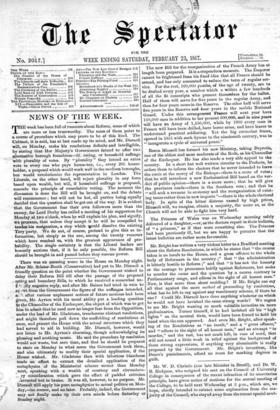There was an amusing scene in the House on Monday
night. After Mr. Sclater-Booth (Conservative) had put to Mr. Disraeli a friendly question on the point whether the Government wished to delay their Reform Bill till after the passage of the proposed ratirg and boundary Bills, to which he received a somewhat un-
dly negative reply, and after Mr. Baines had tried in vain to eT, nrt from the Government the figure of the suffrages intended, al 4 after various unpleasant notices of future motions had been given, Mr. Ayrton with his usual ability put a leading question tp the Chancellor of the Exchequer, the object of which was to get him to admit that he need now no longer fear from the Opposition, under the lead of Mr. Gladstone, treacherous abstract resolutions, and might therefore pull down the scaffolding of resolutions at once, and present the House with the actual structure which they had served to aid in building. Mr. Disraeli, however, would not listen to Mr. Ayrton's charming, though acknowledging its pleasing and soothing music. He said the procedure by resolution would not waste, but save time, and that he should be prepared to state on Monday in what sense the Government took them,. and also ultimately to modify their special application, if the House wished. Mr. Gladstone then with laborious blandness made an effort to extract the detailed application of the metaphysics of the Ministerial scheme sooner than Monday
next, speaking with a wealth of courtesy and circumlocu- ., 17 consideration which gave the effect of padded criticism ,arranted hot to braise. It was all, however, to no purpose. Mr. Disraeli Will apply his pure metaphysics to actual politics on Mon- day,-:no sooner, and no later. Probably, indeed, the Government may not finally make up their own minds before Saturday or Sunday night.






























